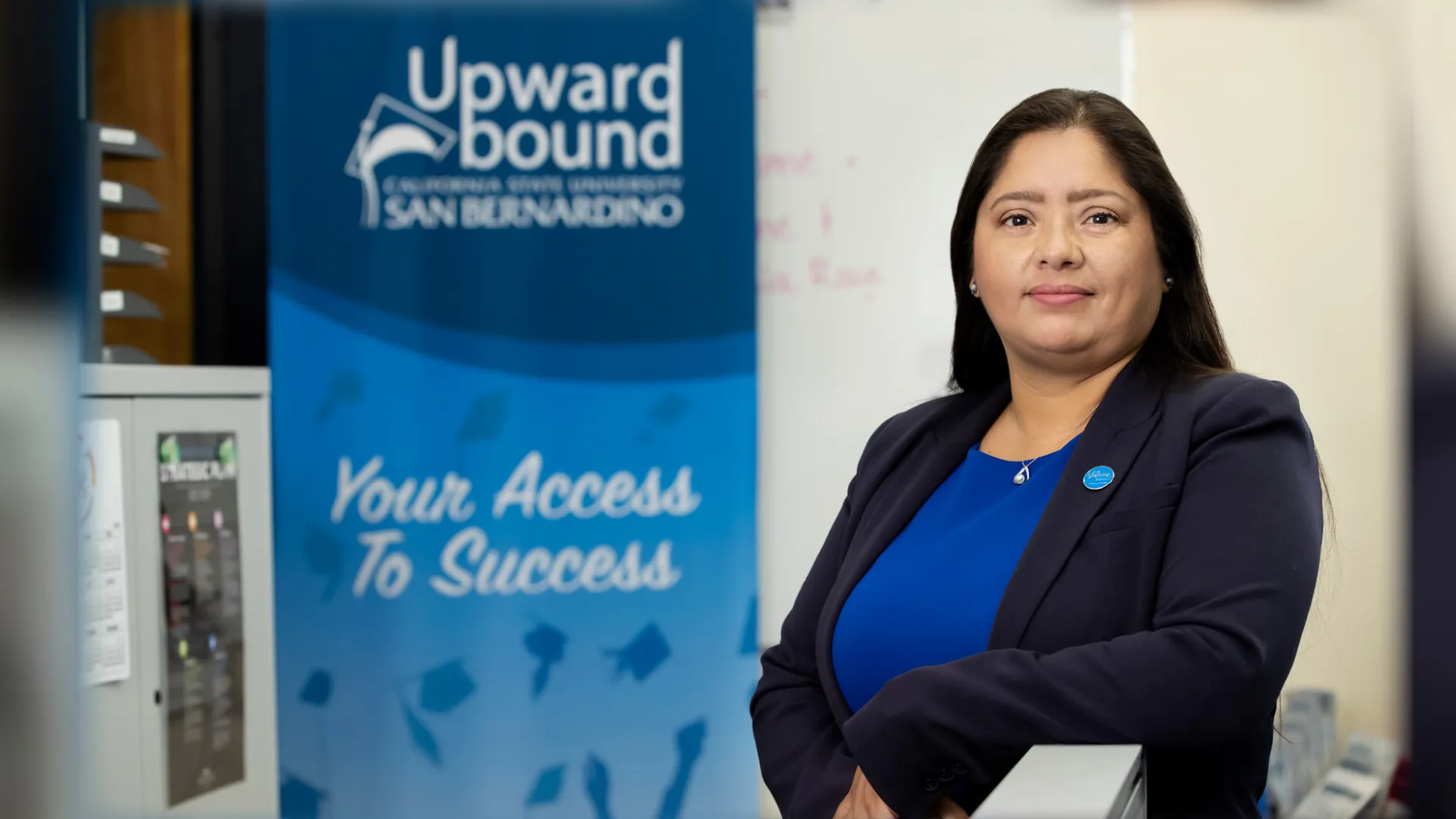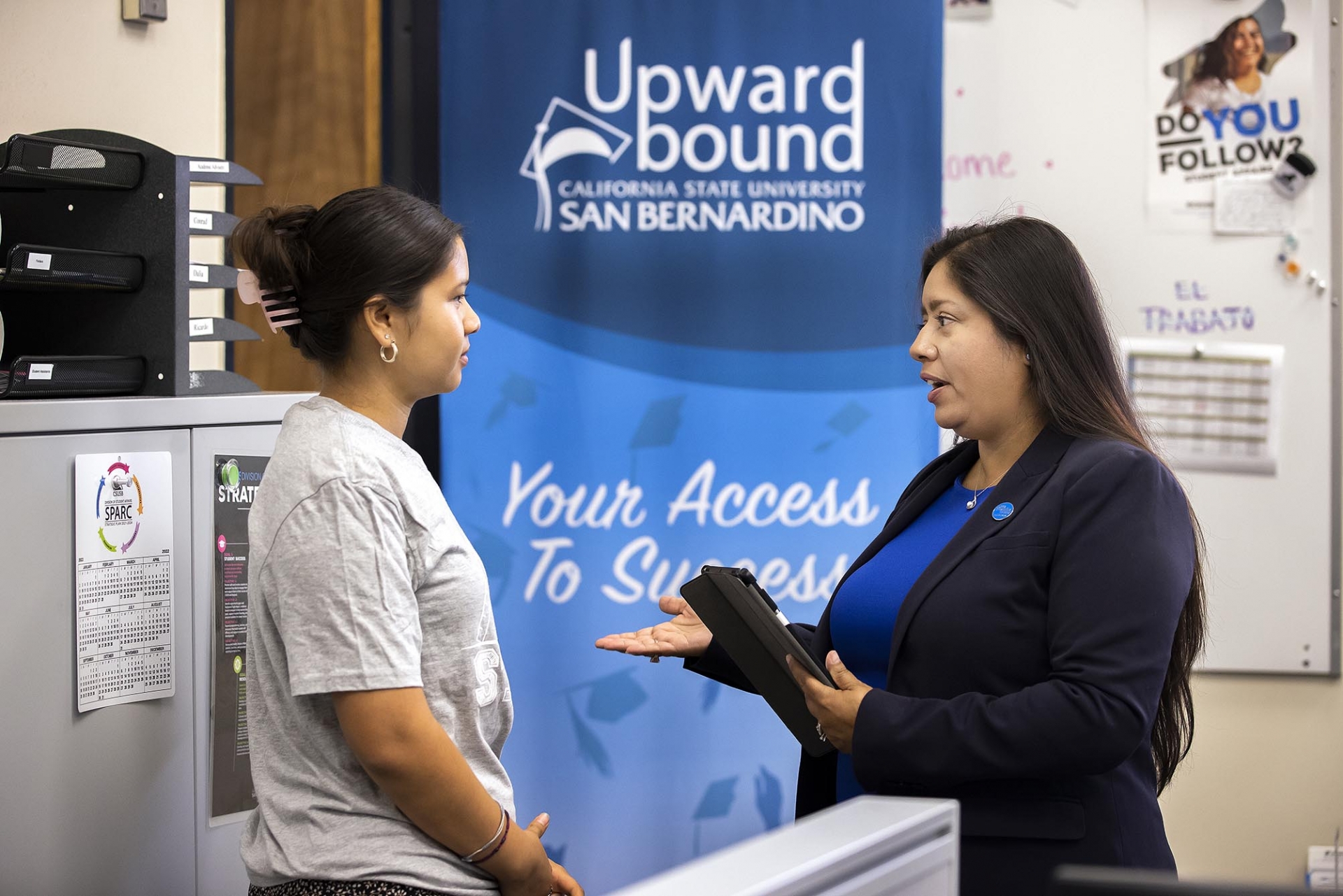Joe Gutierrez | Office of Strategic Communication | (909) 537-5007 | joeg@csusb.edu


Dalia Hernández, the director of CSUSB’s Upward Bound program, is one of only 36 professionals nationwide selected to the American Association of State Colleges and University (AASCU) 2022 Emerging Leaders Program. The prestigious program is designed to prepare the next generation of higher education administrators to be effective leaders and to further their institutions’ path to equitable student success.
Hernández, who joined CSUSB in 2015, oversees Upward Bound, a TRIO program designed to provide low-income high school students with educational and personal support services that will increase high school graduation and college enrollment and persistent rates.
As a first-generation Chicana and indigenous professional, Hernández, in her words, “continues to work to advance the efforts of the Division of Student Affairs and CSUSB to mitigate equity gaps by creating opportunities for students to cultivate their professional, ethical and intellectual development so they thrive and contribute to a globally connected society.
“One thing that we teach our students here in Upward Bound at Cal State San Bernardino is the power of telling your story,” Hernández said, “and taking the power of your story to help others.”
Hernández herself has a powerful story, which includes her personal experience as a TRIO student while a high school senior and college student. The child of Mexican immigrants, she was born in Los Angeles and grew up on a small ranch near the town of Apatzingán in the Mexican state of Michoacán. When she was 12, her parents immigrated to the U.S., settling in El Monte, determined to provide a better life for their family.
“I started school here, not knowing the language, not knowing how to communicate with teachers, with other students. It was a challenging time,” Hernández recalls.
“I’m familiar with the intersectionalities of being part of a mixed-status family where both of my parents and two siblings were undocumented for a very long time,” she said. As their language skills improved, Hernández and her older sister “were charged to help navigate any doctor’s appointments and school meetings. We became the official translators for the family.
“I think experiencing the needs immigrant families have really created the foundation for me to get in this line of work, of being of service, to want to give back.”
Her parents instilled in their children the value of education, Hernández said. “Education to them was the key to opportunity. It was really the pathway out of poverty, out of limited resources. All of us understood that if we wanted a better quality of life, it was likely that education was going to be the easiest route.”

She noted that “as first-generation families, parents have the vision of what they want for their kids and the opportunities they want their children to have access to, but they often don’t know how to get there.”
Hernández discovered a TRIO program during her senior year of high school — Educational Talent Search — which she credits for defining her college and career path. “It was because of this program that I think I was able to enroll in and complete college.”
She began classes at Cal State Fullerton and participated in the Summer Bridge Program for a month before starting the academic semester, living in a campus dorm and experiencing a bit of college life.
“Coming to my first year of college, I think oftentimes we feel that we’re prepared, but we’re really not,” she said. “I ended up being placed on academic probation my first semester. I struggled. I worked really hard and found another TRIO program there, the Student Support Services program, and the following semester was removed from academic probation.”
She began working as a student assistant in a TRIO program that year, eventually becoming an advisor and then a counselor before she graduated in 2000. Hernández said she tells her story to students in CSUSB’s Upward Bound program to illustrate that everyone has challenges.
“We all have different life circumstances, but how do we channel those in ways that we can become successful?” she said. “Because of our life circumstances, we learn to be resilient, to be determined and to continue beyond the obstacles and challenges that are presented.”
After graduating, she married, had three children, and earned a master’s degree in public administration in 2010, all while working full-time administering TRIO programs for a nonprofit in East L.A., moving up the ranks to become its executive director before joining CSUSB.
Hernández said a major component for participants in the AASCU Emerging Leaders program is creating a project at their home campuses. She is already well underway with her initiative, working with colleagues in the Undocumented Student Success Center, Information Technology Services, Institutional Research, Academic Success and Undergraduate Advising, Admissions, Financial Aid, faculty and the Division of Student Affairs to create a data-driven infrastructure to inform decision-making and develop impactful programming for CSUSB’s 755 undocumented students.
“Once the infrastructure is established, we can make data-informed decisions about services, programming, areas for review and process improvements,” she said. “Then we can look at what else can be provided to support our undocumented students, not only on campus, but also with the communities, to ensure that our potential students have the resources and information that they need to be successful.”
What excites Hernández the most about her role at CSUSB is “creating opportunities for disadvantaged, marginalized students, and communities as a whole, to really transform and impact people’s lives. Waking up to that every morning is the fuel that drives me to continue to do the work.
“I tell students to recognize the power of their story, keep in the mind the adversities that you have overcome, channel your story to create a pathway, so it becomes a vehicle for success for you,” she said. “Just as I had people in my life — my parents, mentors, role models, supporters, cheerleaders, my village — who made sure I had a constant reminder, saying ‘Si se puede. You can do it.’ We sit on the shoulders of others, and we need to pay it forward.”